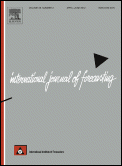
INTERNATIONAL JOURNAL OF FORECASTING
Scope & Guideline
Advancing Knowledge in Forecasting Across Disciplines.
Introduction
Aims and Scopes
- Methodological Innovation:
The journal emphasizes the development and application of novel forecasting methods, including machine learning, Bayesian techniques, and factor models, aimed at improving prediction accuracy and robustness. - Cross-Disciplinary Applications:
Research published in the journal spans various fields such as economics, finance, healthcare, and environmental science, showcasing the versatility and applicability of forecasting methods in real-world scenarios. - Probabilistic Forecasting:
A significant focus is placed on probabilistic forecasting approaches, which provide a comprehensive framework for understanding uncertainty and making informed decisions based on forecasted distributions. - Forecast Reconciliation and Combination:
The journal explores advanced techniques for reconciling and combining forecasts from multiple models to enhance overall predictive performance, addressing the challenges of model uncertainty. - Evaluation and Benchmarking:
There is a strong emphasis on the evaluation of forecasting methods, including the use of competitions and comparative studies to establish benchmarks and improve best practices in forecasting.
Trending and Emerging
- Machine Learning and AI Integration:
There is a growing trend towards incorporating machine learning and artificial intelligence techniques into forecasting models, leading to improved accuracy and the ability to handle large and complex datasets. - Big Data Applications:
Research exploring the use of big data sources for forecasting, including social media, online searches, and sensor data, is on the rise, showcasing the potential for richer datasets to enhance predictive capabilities. - Probabilistic and Interval Forecasting:
A significant increase in studies focused on probabilistic forecasting methods, including the use of predictive intervals and distributions, indicates a shift towards understanding and quantifying uncertainty in forecasts. - Hierarchical and Multi-Level Forecasting:
Emerging themes in hierarchical and multi-level forecasting approaches are gaining traction, allowing for more nuanced predictions across different levels of aggregation and providing insights into regional or sectoral variations. - Dynamic and Adaptive Forecasting Models:
There is an increasing emphasis on dynamic forecasting models that adapt to changing conditions and incorporate real-time data, reflecting the need for more responsive and relevant forecasting in rapidly changing environments.
Declining or Waning
- Traditional Time Series Models:
There has been a noticeable decrease in studies focusing on traditional time series models such as ARIMA and exponential smoothing, as researchers increasingly explore more complex and flexible approaches, including machine learning and deep learning models. - Simple Point Forecasting:
Research centered around simplistic point forecasting methods appears to be waning, with a growing preference for probabilistic and interval forecasts that better capture uncertainty. - Single-Domain Applications:
The journal has moved away from studies that focus on narrow, single-domain applications of forecasting, as interdisciplinary approaches that leverage insights from multiple fields are becoming more prevalent. - Descriptive Forecasting Techniques:
There is a decline in the publication of papers emphasizing purely descriptive forecasting techniques, as the field shifts towards more analytical and predictive methodologies. - Static Model Comparisons:
Research comparing static forecasting models without considering dynamic changes or innovations in methodology is becoming less common, as the focus shifts towards more adaptive and context-sensitive approaches.
Similar Journals
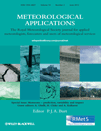
METEOROLOGICAL APPLICATIONS
Exploring Innovative Solutions for Atmospheric ChallengesMETEOROLOGICAL APPLICATIONS is an esteemed journal published by WILEY that has been a vital resource in the field of atmospheric science since its inception in 1994. With an Impact Factor indicative of its credibility and influence in the academic community, the journal has notably achieved a Q2 ranking in the 2023 category quartiles for Atmospheric Science, demonstrating its commitment to advancing knowledge in meteorology. As an Open Access journal since 2020, it provides widespread accessibility to researchers, professionals, and students, promoting collaborative efforts in the pursuit of innovative solutions to atmospheric challenges. With its dedicated focus on interdisciplinary studies in meteorology, METEOROLOGICAL APPLICATIONS serves as a crucial platform for sharing cutting-edge research and fostering dialogue among experts, thereby enhancing our understanding of weather phenomena and their global impacts. For submissions and accessing articles, the journal can be found at WILEY’s headquarters in Hoboken, NJ, representing a hub for scholarly discourse in the atmospheric sciences.

Journal of Operational Oceanography
Connecting Researchers to Drive Oceanographic InnovationThe Journal of Operational Oceanography, published by Taylor & Francis Ltd, stands as a pivotal platform within the field of oceanography, focusing on the integration of operational practices, technology, and scientific research. With a strong impact factor and a notable Q2 quartile ranking in the category of Earth and Planetary Sciences, this journal offers researchers, professionals, and students a vital resource for disseminating new knowledge and innovative methodologies related to ocean studies. Covering a range of topics from marine data analysis to the application of oceanographic principles in sustainable practices, the journal’s content is crucial for advancing understanding in this dynamic field. Operating since 2008 and continuing through 2024, it is dedicated to fostering collaboration and dialogue among the scientific community, ensuring accessibility to essential findings that drive informed decision-making in marine science. With its commitment to high-quality, peer-reviewed articles and a ranking in the top 10th percentile of its category, the Journal of Operational Oceanography is an indispensable resource for those looking to make significant contributions to marine research.

Journal of Grey System
Bridging Disciplines for Enhanced Decision-MakingWelcome to the Journal of Grey System, a distinguished publication dedicated to the advanced study of decision sciences, applied mathematics, and statistical theories. Published by Research Information Ltd, this journal has carved out a niche within the academic community, focusing on innovative methodologies and interdisciplinary approaches that foster a deeper understanding of complex systems. Although open access options are not currently available, the journal has been recognized for its scholarly contributions, achieving impressive Scopus rankings—including a notable #47 in Decision Sciences and a 60th percentile rank in Applied Mathematics. With coverage spanning from 2008 to 2019, the Journal of Grey System remains an essential resource for researchers and practitioners aiming to enhance their knowledge in statistics, probability, and system optimization. As a result, it serves not just as a platform for academic discourse but also as a catalyst for future research endeavors in the evolving landscape of mathematical and statistical sciences.
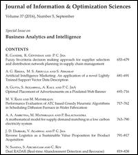
JOURNAL OF INFORMATION & OPTIMIZATION SCIENCES
Elevating knowledge in optimization techniques for a dynamic world.JOURNAL OF INFORMATION & OPTIMIZATION SCIENCES, published by TARU PUBLICATIONS, is a vital platform for researchers and practitioners in the field of information science and optimization techniques. With a focus on the application of mathematical and computational methods to solve complex problems in various domains, this journal aims to advance knowledge and encourage innovative thinking. The journal's ISSN is 0252-2667 and the E-ISSN is 2169-0103. Although currently not Open Access, it strives to provide high-quality research that significantly contributes to the industry. With a commitment to rigor and excellence, the JOURNAL OF INFORMATION & OPTIMIZATION SCIENCES is essential for anyone dedicated to enhancing their understanding and application of optimization methodologies in an ever-evolving technological landscape.
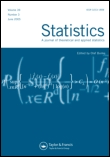
STATISTICS
Connecting theory and practice in the world of statistics.STATISTICS is a distinguished journal published by Taylor & Francis Ltd, dedicated to advancing the field of statistical science since its inception in 1985. With a strong focus on both the theoretical and practical aspects of Statistics and Probability, this journal serves as a vital platform for researchers, professionals, and students seeking to disseminate their findings and contribute to critical discussions in the discipline. Although categorized in the Q3 quartile for both Statistics and Probability and Statistics, Probability and Uncertainty, the journal's commitment to quality research is evidenced by its inclusion in relevant Scopus rankings. It holds respectable positions, ranked #132/168 in Decision Sciences and #219/278 in Mathematics. By providing a venue for high-quality research articles and reviews, STATISTICS aims to foster innovation, reinforce methodological advancements, and address contemporary challenges in statistical applications. The journal does not currently offer open access, but it is widely distributed, ensuring that significant research reaches the communities that need it most. Researchers are encouraged to submit their work to this essential resource that continues to shape the landscape of statistical inquiry.
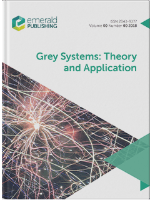
Grey Systems-Theory and Application
Advancing the Frontiers of Uncertainty in Complex SystemsGrey Systems - Theory and Application is a premier journal dedicated to advancing the field of grey systems theory, which plays a pivotal role in addressing uncertainties in complex systems across various domains. Published by Emerald Group Publishing Ltd in the United Kingdom, this journal has established itself as a respected platform for innovative research, boasting a commendable 2023 impact factor reflected in its Q2 categorization in applied mathematics, computer science, and control systems engineering. With Scopus rankings placing it in the top tiers of its fields, it provides a robust forum for researchers, professionals, and students to explore theoretical developments and practical applications. The journal, which has been converged from 2011 to 2024, encourages open conversations on the theoretical underpinnings and real-world implications of grey systems, making it an essential resource for those looking to deepen their understanding and contribute meaningfully to this dynamic area of study.

Econometrics
Fostering Dialogue in the World of EconomicsEconometrics, published by MDPI, is a prominent open access journal based in Switzerland, dedicated to advancing research in the fields of economics and econometrics. Since its inception in 2013, this journal has been pivotal in disseminating innovative theories and empirical findings, fostering an engaging dialogue among scholars and practitioners. With an impressive Q2 ranking in the 2023 category of Economics and Econometrics and a solid position at #378 out of 716 in Scopus rankings, it stands as a vital resource for those seeking to enhance their understanding and application of econometric methods. The journal offers immediate open access to its published articles, ensuring that researchers, professionals, and students alike can easily access and contribute to the evolving body of knowledge in this essential discipline. The scope of Econometrics encourages submissions that cover a broad array of topics, making it a dynamic platform for innovative research until 2024 and beyond.

REVSTAT-Statistical Journal
Advancing Statistical Knowledge, One Article at a Time.REVSTAT-Statistical Journal, published by the Instituto Nacional de Estatística (INE)Open Access model established in 2003, REVSTAT promotes the free dissemination of high-quality research, ensuring broad accessibility to its published works. Although it currently holds a Q4 category ranking in Statistics and Probability according to Scopus, the journal aims to enhance its contributions to the statistical community by featuring innovative methodologies, theoretical advancements, and applied statistical research. With a convergence period extending from 2010 to 2024, REVSTAT invites submissions that not only enrich the discipline but also encourage interdisciplinary collaboration. Its commitment to developing statistical knowledge makes it a noteworthy avenue for anyone seeking to engage with contemporary statistical discourse.

Romanian Journal of Economic Forecasting
Innovating the landscape of economic forecasting since 2008.Welcome to the Romanian Journal of Economic Forecasting, a prestigious publication dedicated to advancing the field of economics and econometrics since its inception in 2008. Published by the Institute of Economic Forecasting, this esteemed journal provides a platform for scholarly articles that contribute to the theoretical and practical understanding of economic trends and forecasting methods. With an impactful presence in the Q3 category of Economics, Econometrics, and Finance, it ranks well on Scopus within its field, holding position #130 out of 288 journals, placing it in the 55th percentile. The Romanian Journal of Economic Forecasting aims to bridge the gap between theory and practice, making it a crucial resource for researchers, professionals, and students eager to engage with contemporary economic issues. Though it operates under traditional accessibility, it encourages authors from diverse backgrounds to share their groundbreaking research, fostering a dynamic academic environment. Explore the rich insights offered by this journal and join a community dedicated to the evolution of economic thought.

Advances and Applications in Statistics
Exploring the Frontiers of Statistical InnovationAdvances and Applications in Statistics is a pivotal academic journal devoted to the dissemination of high-quality research findings in the field of statistics and its diverse applications. Published by PUSHPA PUBLISHING HOUSE, this journal aspires to serve as a dynamic platform for researchers, professionals, and students who aim to share innovative statistical methodologies and explore their practical implications across various disciplines. The journal, with its influential ISSN 0972-3617, fosters open discussion and collaboration within the statistical community, aiming to bridge theoretical advancements with real-world applications. As part of its ongoing commitment to academic integrity and excellence, Advances and Applications in Statistics encourages submissions that not only advance statistical theory but also illustrate their utility in solving contemporary issues in industries such as healthcare, finance, and economics. Although currently lacking an impact factor, the journal's dedication to quality research positions it as a significant contributor to the field. Researchers and academics looking to publish their work in a stimulating and supportive environment will find in this journal a valuable resource.